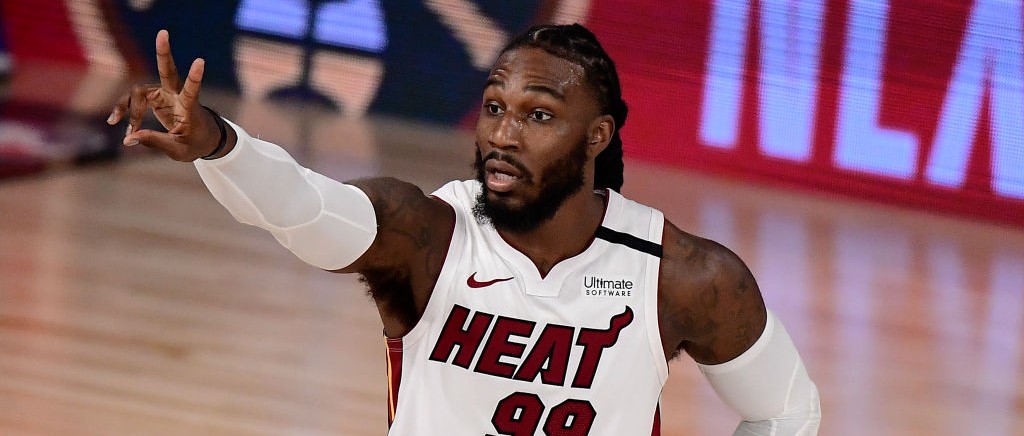
Jae Crowder isn’t on the short list of the most prominent players involved in the Eastern Conference Finals. Even in a series against one of his former teams in the Boston Celtics, Crowder is a role player, albeit a valuable one, and there is only so much oxygen in a series that features Jimmy Butler, Jayson Tatum, Bam Adebayo, Kemba Walker, Goran Dragic, Jaylen Brown and Gordon Hayward, among others. With that said, Crowder’s contributions are exceptionally valuable to the Miami Heat and, in looking back in the not-too-distant past, it isn’t clear that he was always supposed to be a key cog for his new team.
When the Heat acquired Crowder in early February, he arrived alongside Andre Iguodala in a multi-player swap that saw Memphis take on Justise Winslow’s long-term money and Miami ink Iguodala to a lucrative extension. In the moment, the focus was largely on Iguodala, with his exit from Memphis as the top story, even before he earned some extra security via the extension. In fact, Crowder was largely viewed as a throw-in, even with most acknowledging that he could have value as a supporting player on a $7.8 million expiring contract.
Fast-forward to the playoffs, though, and it is Crowder, not Iguodala, that has been the centerpiece of the deal through the prism of 2020. In the 108 minutes with Crowder on the floor against the Celtics, the Heat boast a +7.8 net rating, while Miami falls off a cliff to the tune of a -18.9 net rating in the 41 minutes with Crowder on the bench. There is, of course, some small sample size theater to go along with the noise of individual net rating involved in those numbers, but Crowder is unquestionably a prominent part of Miami’s rotation, starting each of the team’s 12 playoff games and averaging more than 34 minutes per game in the last two series combined.
Iguodala has faded into the background amid whispers of injury issues but, in some respects, Crowder is more prominent than ever. The Celtics, who know his game well from a multi-year stint in Boston, are game-planning away from Crowder and, frankly, they are likely right to do so.
Miami deploys lineups that are sometimes overflowing with quality offensive options, especially when Crowder is playing the 4 next to Adebayo and a trio of high-powered perimeter options including Dragic, Butler, Tyler Herro and Duncan Robinson. As such, the Celtics are often “letting” Crowder beat them from three-point distance and, in Game 3, the 30-year-old forward wasn’t able to make Boston pay.
Crowder converted only 2-of-10 attempts from three-point range in that contest, perhaps experiencing some regression from a scalding hot playoff run. After a 29.3 percent three-point clip for Memphis in 45 games this season, Crowder knocked down 44.5 percent of his threes (on 6.4 attempts per game) for Miami down the stretch of the regular season and leading into the Orlando bubble. In the playoffs, Crowder has continued his marksmanship, converting 38.5 percent of his three-point attempts (even including the shaky shooting in Game 3) and his volume has increased to 8.7 attempts per game in the postseason.
Finding the baseline with Crowder’s shooting is a tough exercise, simply because he has experienced some lofty highs and some maddening lows with his three-point efficiency in the past. In his first four NBA seasons, Crowder shot only 32.4 percent from three-point range on relatively low volume. From there, he experienced a career renaissance in 2016-17, burying 39.8 percent of his threes for Boston and earning the reputation as one of the best bargains in the NBA on a (very) reasonable contract. Once he left the Celtics, though, Crowder cratered in Cleveland and Utah, shooting just 32.8 percent in the next 160 regular season games, and those hiccups continued in Memphis.
The NBA Playoffs are, by their nature, a small sample size endeavor and, at the moment, Crowder is playing with the confidence to let it fly. That bodes well for the Heat, especially when he converts open opportunities, because Boston is likely to continue scheming away from Crowder and he must continue to fire away. In fact, the Celtics have been putting Kemba Walker and other sub-optimal defenders on Crowder, leading to some rumblings that the Heat could have adjustments in the offing to take advantage.
Jae Crowder said, yes, there will be changes if the Celtics again defend him with Kemba Walker. Said he just can’t give anything away. Said same if Celtics again defend Andre Iguodala with Enes Kanter.
— Ira Winderman (@IraHeatBeat) September 21, 2020
While changes could be coming, the Celtics are essentially betting against Crowder’s shooting, while the Heat need him to convert. That isn’t the only pivot point in a series full of stars, but Crowder’s defensive contributions are well-documented in that he is switchable, physical and competitive in a number of match-ups. He can be a highly valuable player even with just average (or even below-average) shooting but, in the crucible of the playoffs, Crowder’s shooting could play a significant role in determining the winner of a series that is now back to toss-up territory after Boston’s Game 3 win.
